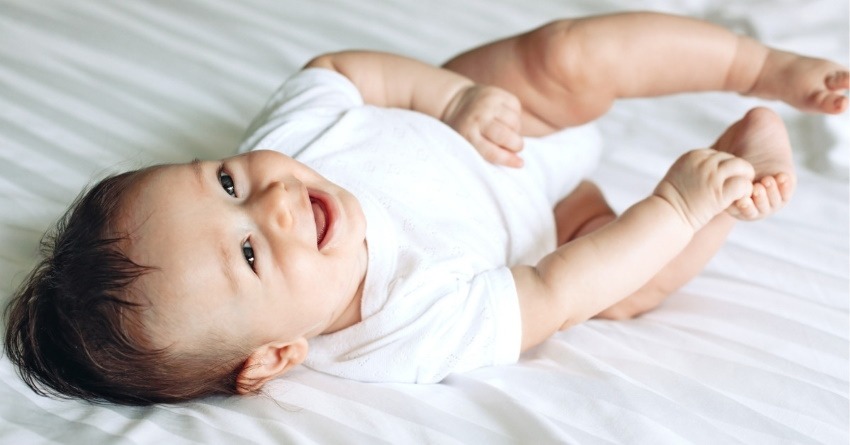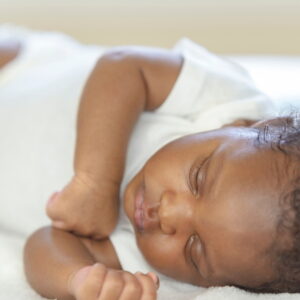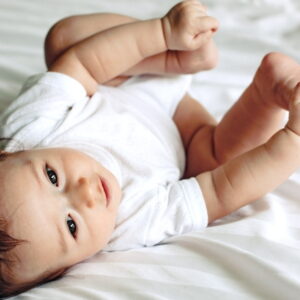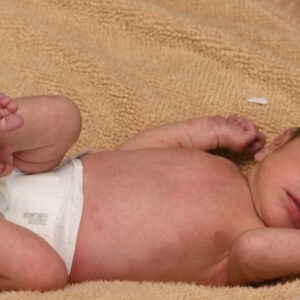What if a baby is not peeing?
Here, a mom asks about her 4-month-old baby that hasn’t peed for several hours. Let’s go through why this may be and how to handle the situation.
 Pin
Pin
Mom’s Question:
My 4-month-old baby is not urinating. My son is acting normal – he slept for 13 hours and woke up happy, but he had a dry diaper when he woke up. He ate as he would normally eat, and now, after 1 1/2 hours, he still has not urinated. So my baby hasn’t peed in 15 hours or so! Should I be concerned?
What could the reasons be? I am worried that he is ill and that it can be dangerous.
What If a Baby Is Not Urinating?
First, let’s state the normal dynamics of urination in infants. Babies do not have any bladder control; hence they urinate whenever or wherever they can. They urinate as often as every 1 to 3 hours. Urinating does not cause any pain. The normal color of urine is light to dark yellow. Read more about how often a baby should pee here.
Children generally have no bladder control during their first year, and after that, it develops gradually. (Some research studies indicate that early potty training accelerates bladder control significantly so that such trained children can already have some control at around 9 months). At 4 months, like your son, it is still way too early.
So, 15 hours is quite a long time for a baby to go on without peeing. The general guideline is that a baby should urinate at least once every 1.5 hours and certainly not go without urinating for longer than 6 hours.
Let’s look at some of the possible reasons that may cause your baby not to urinate for a long time.
In this article:
1. Your Baby Actually Peed
Babies often pass urine, but the parents won’t notice. This is because disposable diapers are so efficient in soaking up urine. If you tear his old diaper apart, you can examine the small beads in there. If they are warm or if they smell urine, your son has urinated.
If you are unsure, try wrapping him in a cloth diaper or a swaddling cloth for around 1.5-2.5 hours to see if he urinates (infants generally urinate every 1.5 hours).
It is possible that this is just a one-time event or that your baby has urinated and the diaper just absorbed it all, but I think you should still take this seriously.
2. Urinary Tract Infection (UTI)
This is a common disease in babies since they are often in their diapers, and parents sometimes miss changing them out of these.
A wet diaper is a playground for all the bacteria to accumulate, and sometimes, they go up the urinary tract to cause an infection (bladder) or up the ureters to cause a kidney infection.
The signs and symptoms for newborn babies and infants less than 2 years old who have UTIs are more non-specific than older children. These include:
- Fever
- Frequent or infrequent urination – they can pee frequently in small amounts or go for hours without peeing.
- Strong or bad-smelling urine
- Dark or blood-streaked urine – this may connote the presence of blood in the urine, which may be caused by UTI or obstruction in the urinary tract
- Loss of appetite -your baby may not eat as often and as much as he would normally.
- Diarrhea
- Vomiting
- Irritability – your baby may be squirming all the time and be grumpy when being played with
UTI can be recurrent, which can later damage the kidneys. This can occur especially when an anatomical abnormality exists in infants and younger children. This anatomical abnormality is called vesicoureteral reflux. Early diagnosis and treatment of this abnormality can spare the infant’s kidney.
Parents should always consider the possibility of a UTI when their babies have unexplained fever or when there is no apparent focus of infection.
Treatment with antibiotics can prevent kidney damage and the further spread of bacteria into the system. Imaging of the urinary tract is also a part of management, especially when there is a recurrent UTI. Drinking plenty of fluids (breast milk, formula, and – later on – water) can prevent UTIs. Careful cleaning after pooping can also prevent UTI.
3. Dehydration
Dehydration is the loss of excessive fluids in the body. Causes could include vomiting or watery diarrhea. In infants, fever can also cause dehydration, as well as decreased intake of fluids. A lot of things can happen when your infant is dehydrated.
Signs of dehydration include:
- Dry lips, dry tongue, and dry eyes (no tears when crying)
- No urine output for an extended period (dry diapers)
- Drowsy or irritable
- Does not feed
- Sunken fontanels (hole on top of the head) and eyeballs
- Dry skin [when you pinch it, there is poor skin elasticity (doctors call it turgor)]
- Deep and rapid breathing
- Cold and clammy skin and hands and feet
If any of these signs are present in your baby, you should bring your baby to the emergency room right away. Other signs of severe dehydration include seizures or altered mental state (lethargic). Any of these signs are a red flag.
4. Urinary Tract Obstruction
An unexplained fever that is recurrent should raise suspicion of UTI. On the other hand, recurrent UTIs in babies should also warrant extensive investigation as this may mean a urinary tract obstruction. Anatomical anomalies may occur, which may go undetected in infants. Hydronephrosis can occur in babies prenatally or postnatally. Sometimes, this resolves spontaneously by the time the mother has given birth. However, for those that persist, the only sign would be a recurrent UTI.
In hydronephrosis, urine backflows into the kidney due to an obstruction in its pathway. The obstruction could be in different areas in the urinary tract. Hydronephrosis could be mild, moderate, or severe. Mild to moderate hydronephrosis does not affect kidney function; however, a severe condition does.
Signs and symptoms include pain in urination, blood in the urine, and back pain, and all the signs and symptoms associated with UTI are present.
When your doctor suspects an obstruction, your baby is referred to a specialist called a pediatric urologist.
When to Call the Doctor
When your baby is not urinating, these questions will help you assess whether to take your baby to the Doctor:
Is your baby exhibiting signs of infection, like a fever?
Does he have any episodes of diarrhea or vomiting?
Is he abnormally drowsy or difficult to awaken?
Are his eyes dry when he cries?
Does he not have the usual appetite to eat or drink?
Is the gap between a wet diaper and a dry one longer than usual?
If so, immediately take him to your doctor. Look for other red flags, as mentioned above. There is no need to delay management.
Takeaway
As you see, there may be different explanations for the fact that your baby is not urinating (or at least not enough for you to have noticed). And what to do depends a lot on the situation, how much milk he recently drank, and if he seems ill.
If your child’s behavior is normal, do not feel you must rush him to the emergency room. If you are worried, you can call the nearest hospital and ask to speak to the triage nurse. She can assess the critical symptoms and give you a “soft recommendation” over the phone.
If he becomes very tired, gets a fever, is fussy, or shows any other sign of illness or pain, contact a doctor immediately.
Your baby is hopefully just fine, but nevertheless, you are right to take it seriously that your baby is not urinating. Do examine his diaper, offer some liquid if he hasn’t had any recently, and call the Dr – all right now!
Good luck,
Paula
More About Babies And Urination
Research References
- Urinary Tract Infections (UTI) in Children
- Urinary bladder control during the first 3 years of life in healthy children in Vietnam–a comparison study with Swedish children
Is your baby not urinating too? Share your situation and any tips you have!

Paula Dennholt founded Easy Baby Life in 2006 and has been a passionate parenting and pregnancy writer since then. Her parenting approach and writing are based on studies in cognitive-behavioral models and therapy for children and her experience as a mother and stepmother. Life as a parent has convinced her of how crucial it is to put relationships before rules. She strongly believes in positive parenting and a science-based approach.
Paula cooperates with a team of pediatricians who assist in reviewing and writing articles.







My one year old hasn’t had a wet nappy all day his nappies stay dry no sign of urine….what should I do…. I’m worried
My 3-month-old child has a cold. His symptoms are coughing, congestion, runny nose, pink or rash on face, body, between skin folds. His void is colored yellow with a slight tinge of green. His diapers are dry for about 6-8 hrs now, but my wife and I noticed a slight pinkish color on his diaper where his urine usually is. He is breastfeeding well and smiles and is attentive, but we’ve noticed him sleeping more often now. After he feeds he is irritable. He cries when he coughs because of his runny but sometimes clogged nose and congestion sometimes causes him to gag. We’re hoping he doesn’t have UTI.
my 4 months old boy does not to urinate often. he can go up to 5 hours without urine. on the overall he is happy and gains weight. he doesnt drink much during the day but during the night he drinks after every 2 hours or even less (about 60-80 ml). he is on formula- nan 1. he poops 2 or 3 times a week. he was hospitalised for high sodium during first month of his life, i dont know if it is related. any ideas please advise.